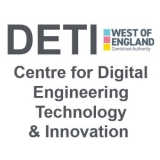The DETI project
By Staff Writer, écoute moi
At its meeting today (31 Jan), WECA awarded £5m to the new Centre for Digital Engineering Technology & Innovation (DETI) – to match-fund £5m from West of England businesses who are at the forefront of industry. It is a flagship investment which supports the region’s Local Industrial Strategy and is one of the building blocks in creating a Global Centre of Innovation Excellence – bringing together innovative expertise to solve future challenges.
DETI is a research, innovation and skills initiative – it’s a collaboration of industry and academic partners led by the National Composites Centre (NCC) – which sets out to develop and accelerate digital engineering across multiple industry sectors – to benefit future generations of engineers and engineering products, and to help tackle global challenges.
The DETI project
West of England Mayor, Tim Bowles said: “Our region is a global leader in high value design and innovation, and we want to make sure we retain that position in the face of global competition. DETI will help us do that by putting the West of England at the forefront of the fourth industrial revolution and bring together the worlds of digital technology and advanced engineering.
The DETI project will develop training courses related to advanced digital engineering, with the aim of increasing the skills and retraining those in the current workforce. It will also engage with schools, particularly in less affluent parts of the West of England, with the aim to reach 1,000 children and inspire them to pursue a career in digital engineering.
DETI is not a new building but will use existing facilities and assets – at the National Composites Centre (NCC) and another crucial partner in the collaboration, the Centre for Modelling & Simulation (CFMS), at the Bristol and Bath Science Park – to undertake its research, innovation and skills initiatives. It brings together the wealth of specialist expertise from around the region and harnesses it to maximise opportunities for a better future.
The DETI project
It will work with leading companies and support industry to reduce carbon emissions by producing better products – products that are lighter, more fuel efficient and have less waste – through undertaking research and innovation in the virtual world.
Businesses investing in DETI alongside WECA and the NCC include Airbus, Rolls-Royce, GKN, Baker Hughes, CFMS and UWE. DETI will also receive contributions in kind from Siemens and Toshiba. The project has already engaged with over 100 companies across the region, including disrupters TechSPARK and Smartia, and companies covering sectors such as renewable energy, marine, aerospace and electronics.
Richard Oldfield, CEO of the NCC, said: “The world faces unprecedented challenges which will require step changes in how society uses resources. DETI will bring together leading companies and tech disruptors to create the design and digital engineering of the future. It will help cement the UK’s world leading position as an engineering nation, helping to overcome the world’s most complex challenges.
The DETI project
“We have already engaged with a really diverse range of companies across the tech, design, creative and engineering sectors to create an exciting collaboration where skills collide. With this investment from WECA, matched by industry, we will spend the next two years building skills, creating jobs and making the West of England the go-to place for UK high value design and engineering – putting the region on the world stage as a globally significant engineering and tech area.”
DETI has the potential to reduce carbon emissions on a scale that achieves lasting and transformational change. DETI is working with leading companies in a sector of the economy that can have a major impact on reducing carbon emissions. DETI’s role is to support industry to produce better products; products that are lighter, more fuel efficient and have less waste through undertaking research and innovation in the virtual world. DETI’s services will be used by companies in transport, energy and construction, which all must play a major role in meeting this legally binding target.
The DETI project
The NCC is crucial partner in the Airbus Wing of Tomorrow Programme – the biggest research and technology programme taking place in the whole of Airbus globally – and is working hard to push the boundaries of composites manufacturing way beyond the current capabilities.
